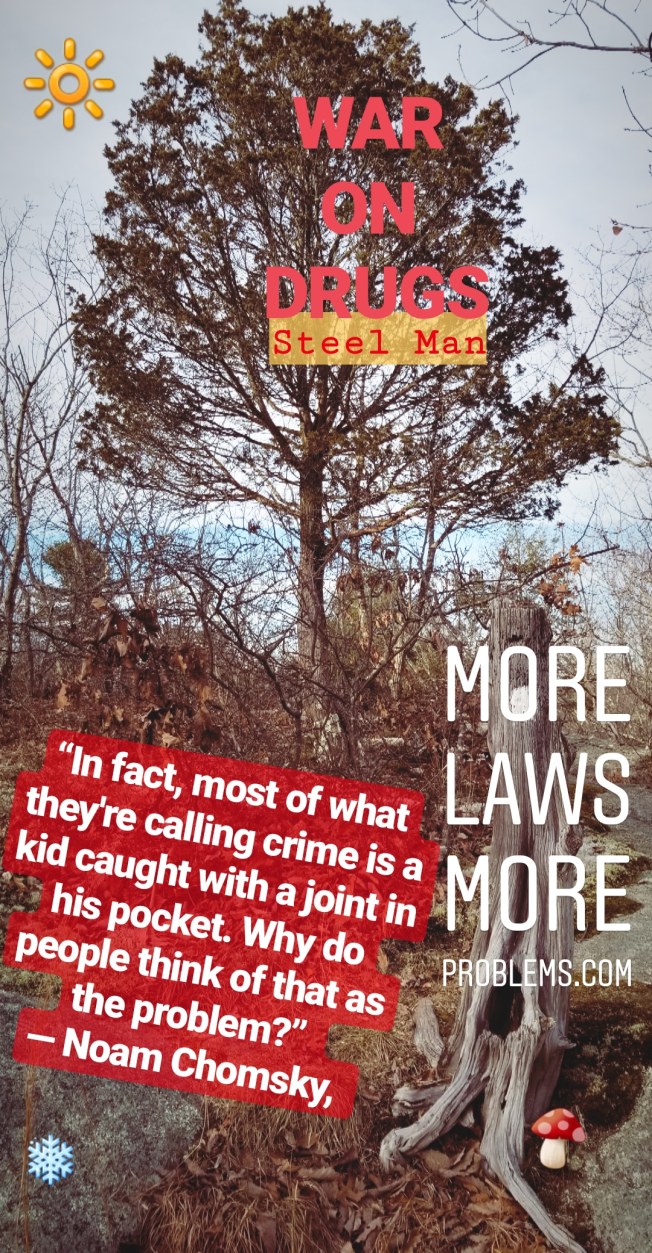The “Steel Man” tactic is the opposite of the “Straw Man” tactic in an argument. The latter is a tactic in which one misrepresents an opponents argument and then attacks that misrepresentation. An example of this in regard to the War on Drugs, following the theme of last week’s article, goes like this:
Person A: “We should abolish the War on Drugs, fully legalize all drugs. Prohibition only leads to a black market, which breeds violence.
Person B: “You think we should tell our children that drugs are okay and encourage our youth to use them? Without the War on Drugs in place, our kids will think drug use is perfectly acceptable and society will be ruined!”
Notice how instead of attacking the argument directly, Person B, put words in Person A’s mouth and then attacked this false narrative. Whether, because a sufficient argument is lacking, or a misunderstanding occurs, it doesn’t really matter. No argument is actually made against the original argument meaning no true resolution can be met. Most times bickering or nasty social media comments follow this type of exchange.
A much better way to attack an opponent’s argument, assuming, of course, a solid rebuttal exists, would be the Steel Man tactic. The way this works is one builds an argument in favor of their opponent, but an even better one then attacks this superior argument. A person not only demonstrates a much better understanding of a particular subject by making their opponent’s case stronger but also closes loopholes which could lead to further objections later in the debate.
Using the Straw Man example from earlier as a starting point, the rest of the article is a Steel Man Argument in favor of the War on Drugs followed by a simple, complete and coherent argument against it.
So here’s a Steel Man Argument in favor of the War on Drugs:
“Children are the weakest and most impressionable of all the humans in this country. It is very easy to see how they would be the ones most vulnerable to the toxic effects of drug abuse by someone close to them. Children have little to no autonomy, especially very young ones. They have no recourse if a parent or worse, both parents are abusing drugs. They have to rely on the charity of others in their family or community, on the hope that, not only, someone listens to them long enough to realize what’s going on, but cares enough to do something about it in a way that actually helps the situation.
Overall the legalization of drugs will make it easier for people to obtain them. The increased flow of drugs will create more addicts leading to more oppressed and depressed children. Not to mention that legalization will undoubtedly make it easier for children themselves to obtain drugs, which would lead to a sharp rise in the amount of drug-addicted children in this country.
Maintaining, if not, increasing the size of the War on Drugs is the best way to keep our children safe. By having the watchful eye of the state constantly looking after it’s citizens, through the virtually unlimited supply of state-run law enforcement, this country will ensure the highest level of safety possible for the most vulnerable and weakest among us, our kids!!”
One could go deeper and build an even stronger Steel Man, but for the sake of brevity, this article will now begin to lay out arguments against this Steel Man.
The basic question one must ask themselves when facing the “War on Drugs” question is the same one that Joe Rogan made famous: “Do you think it’s OK to lock someone in a cage because of a plant?” This article will go further and will add “All Drugs” to this question. Is it OK to lock a person in a cage because that person uses a substance? Of course, if a person hurts, abuses or violates any other person’s right as a result of this use they should be held accountable for said offenses. The laws that already exist against these offenses negate the need to make the use of the substance itself the focus of the law. Plainly stated: “Murder, theft, assault etc. are already illegal. There is no need to make the drug itself illegal. If a person could use a substance without violating an other’s rights then what right does anyone have to throw a harmless user in a cage.
Furthermore, the fact that the current War on Drugs, with all of its sophisticated rights-violating technology, still cannot keep illegal drugs out of the most secure areas of this country, Federal Prisons, proves its ineffectiveness. One need only look to the prohibition of alcohol in the U.S. in the 1920s to see that prohibition only creates a black market. A black market which begets the most heinous violence while propelling ruthless criminals to the top of giant global drug networks. With full decriminalization the current cartels and networks in place would most likely collapse. Also highly probable is that the price for drugs would fall due to the ease of obtaining them. The very costly middleman, who normally has to smuggle or illegally produce the drugs, would be cut out. The purity and ingredients would be guaranteed or your money back. Extremely declining the odds of an accidental overdose.
Assuming the prices do fall and the availability does increase, the crime which surrounds the current drug epidemic would plummet. If our convenience stores had drugs right next to and comparably priced to say cigarettes or beer, how many fewer violent crimes would occur as a result? Especially if the current stigma attached to drugs, because they are illegal, disappeared. This predictable decrease in violence would permeate into all levels of society leaving no doubt as to the fact children everywhere in the U.S. would be much safer.
These, of course, are all assumptions because there is a War on Drugs. Many people do feel that they have to hide their addiction. Especially parents who fear a state system, which could be even more abusive, taking their children away. Because of this many parents are alone in dealing with their addiction, ultimately leading to a rise in otherwise avoidable abuse. But even if these benefits can be proven false, the question that still remains is: “Do we find the act of locking up a person, who harms no one else, in a cage for possession a substance consistent with the values of a free society?”
“OK, big deal, we would be freer, but back to the safety of the kids! Drugs will flow throughout our schools!!”
Concerning the fear that drug decriminalization will increase the supply of them, a comparison to what happened during the Prohibition Era seems appropriate. Among all of the excellent research found in the paper Alcohol Prohibition Was A Failure by Mark Thorton, including a study showing the dramatic increase in alcohol content of the alcohol consumed during Prohibition and it’s subsequent decline after Prohibition ended, as well as noting the thousands who died every year as a result (Mirroring accidental overdoses seen today due to higher potency e.g. Fentanyl.) , there is this personal account concerning the increased supply of alcohol during the Prohibition Era:
Even if one is still unsure what impact ending the War on Drugs would have on the supply of drugs, it should be reasonable to agree that by ending this War, the trade will be forced back into the light of day. Into the transparency of a freer market. Back into the hands of business owners who must offer value to a customer and provide a positive experience in order to stay in business. Just as with the owner of any store that sells alcohol to children, any business owner who sold drugs to kids would not stay in business long.
Therefore, by changing who the supplier of the drug is, the worry over the amount of the supply is negated. The “Legal” drug trade that currently exists in this country, with Pharmacists and Doctors, is by no means perfect but when compared to scoring drugs on a street corner, it seems a much safer alternative. An alternative that also seems more likely to restrict flow to minors. This could have a dramatic effect on their ability to acquire drugs. There is plenty of anecdotal evidence that in this age of drug prohibition it’s easier for a minor to obtain illegal drugs than it is for them to get some beer. Drug dealers don’t usually check I.D.
Facing this, as stated earlier in the article, the criminal organizations who are currently behind the drug trade will most likely be forced out due to lack of customers. This translates into safer environments for our children. When you don’t have drug dealers defending their turf with violence, whether on a street corner or in a school, everyone is much safer.
It’s also worth a look at the country Portugal and their progression since they decided to decriminalize all drugs in 2001. Since then Portugal has seen dramatic drops in overdoses, HIV infection and drug-related crime. Free of the fear of legal consequences as well as any social stigma, people are able to more enthusiastically find a solution to their addiction. Taken from the above-linked article:
“Portugal’s policy rests on three pillars: one, that there’s no such thing as a soft or hard drug, only healthy and unhealthy relationships with drugs; two, that an individual’s unhealthy relationship with drugs often conceals frayed relationships with loved ones, with the world around them, and with themselves; and three, that the eradication of all drugs is an impossible goal.”
Adopting a similar approach in this country could open up new opportunities for addicts seeking treatment. As seen in the creation of Alcoholic Anonymous in 1934 following the repeal of Prohibition. It’s not hard to imagine the giant impact this could have on keeping more families together. Thus keeping children safer.
One could also point to the money that would be saved in ending this war. Money that could stay in the pockets of the average citizens allowing them to focus more resources on family safety and better overall living conditions if they so choose. None of these solutions could ever be seen as perfect, but when placed in honest comparison with the status quo, it would seem hard to argue that ending the drug war wouldn’t make children safer with the added side effect of making everyone in this country a lot freer.

































